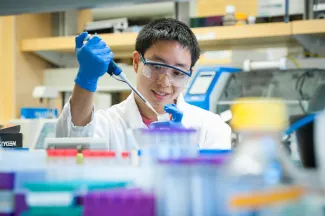“Don’t be afraid to get involved. Trying new things and stepping outside your comfort zone is when you grow the most, and I can almost guarantee you won’t regret it.”

Brandon Chen
- Degree:
- Bachelor of Applied Science
- Grad year: 2021
- Program:
- Campus: Vancouver
I have always had a passion for food. Many of my earliest memories revolve around the dinner table and trying foods from both of my cultures. I was (and still am) very curious about the world around me, wanting to know why the world worked the way it does. Naturally, I was drawn to the sciences in school, and I eventually found myself considering studying engineering in high school.
When I arrived at UBC, I knew I wanted to study something related to chemistry and engineering, but I didn’t have a set career in mind. I remember strolling up and down main mall on Imagine day, trying to remember the names of the hundreds of clubs I was interested in, when I stumbled upon the UBC ChemE Car team. I started talking with some of the team members, and they encouraged me to join the team. That single signup was probably one of the most influential decisions I had made in my degree. Within the first few weeks, I was already in the lab with upper year chemical engineering students, and I made some of my best friends through the team. Fast forward five years, and I have just served as president of UBC Envision, a student team incubator within the CHBE department, who also supports ChemE Car. I’ve gained so many technical and leadership skills through my design team experiences and have also made so many of my closest friendships.
Now, as I am graduating from my bachelor’s, I am eager to apply what I have learned to my love of food, and to hopefully help irradicate global hunger and malnutrition. This fall, I will be entering a master’s program, where I intend to focus on bringing chemical engineering practices into the food and beverage industry, with an emphasis in winemaking.
Why did you choose to go into your field of study at UBC?
I suppose chemical engineering was always a natural fit for me since it combined my love of chemistry with the analytical problem solving that engineers do. Engineering also seemed like the perfect blend of my creativity and admiration of science. My high school chemistry teacher encouraged me to do more research on career paths in chemical engineering, and I discovered that the field was much broader than I initially thought, and that I could work in a wide range of industries.
Upon applying to universities, I remember UBC standing out to me. As someone who loves the outdoors, I felt drawn to Vancouver’s unique blend of city and nature. I also liked how UBC’s campus reflected that balance of nature and city, with pockets of forest here and there. Academically, UBC is consistently ranked as one of the top universities in the world, and with so many ways for students to get involved outside the classroom, coming to UBC felt like a no-brainer!
What has made your time at UBC memorable?
Some of the best memories and friends I have made here at UBC has been through my experiences on engineering design teams. I have been involved with student teams in some way throughout my entire time at UBC, but the first team I ever joined was the UBC ChemE Car team. A piece of advice one of my team captains gave me early on about design teams is that “you get out what you put in." That really stuck with me, and I remember being driven to learn and get involved in as much as I could in my design team. In my second year, I became the lead of one of the sub-teams, and at the end of that year, our homemade chemically-powered car made it to the National ChemE Competition for that year.
After my experiences on ChemE Car, I became involved with UBC Envision, which acts as both as a project incubator in the CHBE department and also as the student chapter of the American Institute of Chemical Engineers (AIChE) here at UBC. Over the three years I’ve been involved with Envision, I’ve helped Envision grow from its founding to a fully-fledged ex-officio club, supporting three other student teams in the CHBE department. During my final year at UBC, I served as Envision’s president, and coordinated an all-virtual speaker series and a CHBE student-oriented conference.
Through the years, I’ve made some of my best friendships through design teams, and have really enjoyed being both a technical member and a team lead. Although I’ve invested hundreds of hours inside and out of the lab, I would not trade anything for the memories I made as part of my design team experiences.
What advice would you give a student entering your degree program?
My advice to any student would be to get involved. Pick something you’re interested in, and I can almost guarantee there is a student team or club that will welcome you. You’ll end up meeting many of your closest friends through clubs, and many times you’ll gain experiences that you would never have the chance to through your courses alone.
Do co-op to gain experience outside the classroom. Real-world engineering is very different from what you learn in class. Co-op also allows you the flexibility to work in multiple industries, which can certainly be helpful in a broadly applicable field like chemical engineering. Even if you do know what industry you’d like to work in, co-op terms give you a foot in the door for a job post-graduation, which is always an added bonus.
If you are able to, go on exchange! My exchange term at the University of Queensland (UQ) really pushed me to grow personally and professionally, all while exploring the beautiful beaches of Australia. I firmly believe every university student should go on exchange. You not only get to take courses not offered at UBC, but you also get the chance to fully immerse yourself in another country’s culture and language, not to mention all of the lifelong memories you’ll make!
Last, but certainly not least, don’t be afraid to take classes for fun. After my exchange term, I started looking for more food science classes at UBC, and I stumbled upon FNH 330 – Introduction to Wine Science. At the time I didn’t know much about wine, but I thought why not give it a go. I ended up loving the course, and saw instant parallels between the winemaking process and chemical/process engineering. Today, I’m so glad I took the leap, since that one course ended up inspiring me to pursue a career in the wine industry. Even if you’re not into food science, UBC has classes for almost anything you can imagine, and it’s the perfect time to learn something you’re interested in from professors who are leaders in their fields.
How do you feel your degree has benefitted you compared to a different field of study?
One of the reasons why I chose chemical engineering is the wide breadth of industries that the degree allows you to work in. Chemical engineers are involved in almost every product out there in some way, from petrochemicals and biotechnology to advanced materials and food processing.
That flexibility allowed me to explore many different fields during my degree. When I first joined CHBE, I initially wanted to work in one of the many environmental protection industries that chemical engineers work in. I completed a co-op at a large fuel cell manufacturing company, and I truly felt that my work was helping make a difference in the growth of renewable energy. However, when I took my first few food science courses during and after exchange, I began to realize that I could combine my degree with my love for food in a way I had never thought of before. To me, that is the beauty of the flexibility of chemical engineering, in that there are endless possibilities for what you can pursue as a career.
What are your future plans to make a difference in our world?
I believe that access to nutritious food is a human right, and that no one should go hungry or malnourished in today’s society. Studying the chemistry and processing of food made me realize how my chemical engineering background can be used to make higher-quality food widely available for more people. I feel inspired that I can help provide life-sustaining food to the food insecure, and to help irradicate hunger. I also hope that my diverse background and global experience will allow me to bring a unique perspective and fresh ideas to this industry.



